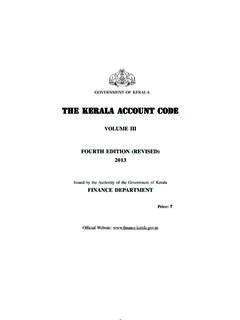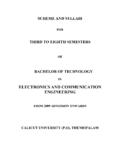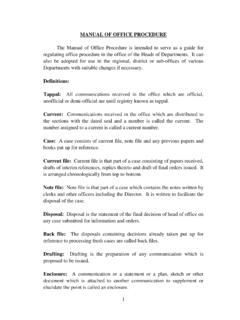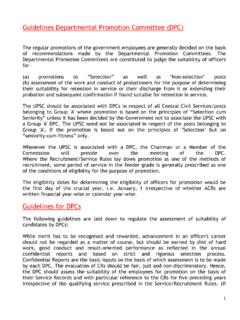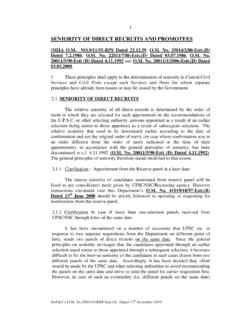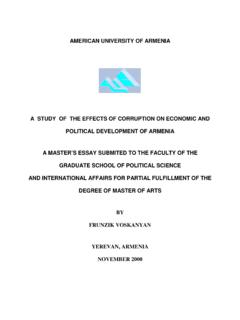Transcription of Kerala Government Servants Conduct Rules 1960
1 1 Government Servants Conduct Rules 1960 The Government Servants ' Conduct Rules , 1960 came into existence in January 1960 . This is issued as a statutory notification invoking the powers conferred under Article 309 of the Constitution. All the notifications issued under Article 309 of the Constitution are deemed to be issued under the Kerala Public Services Act, 1968 (Act 19 of 1968). This is the legal setting of the Conduct Rules . Applicability The Conduct Rules applies to all Government Servants under the rule making control of the Government of Kerala and some of the provisions do not apply to the Advocate General and other Advocates of the Government .
2 It applies from the date of becoming a member of the service and continues its applicability during leave, suspension, joining time. In short, the applicability ceases only when the person ceases to be a member of the service by termination, resignation or super-annuation. (Rule 2 & 5) Integrity and devotion to duty Every Govt Servant shall at all times maintain absolute integrity and devotion to duty (Rule 3). Hospitality A Government Servant shall not accept unnecessary hospitality in the form of felicitation meetings, gifts, rewards, use of vehicles and social gatherings in their honor (Rule 6-10) General Conduct They shall not collect money from the public except when authorized by Government or on permission from Government .
3 (Rule 14) But as per GO (MS) 228/71 PD dated 9-8-71, the HOD can grant permission to staff to collect money from them to provide relief to the family of a deceased govt servant. The resignation of public functionaries or officials shall not be purchased. This is to avoid an attempt to bag that position for them. (Rule 15) Lending money and borrowing money are not permitted. This mainly applies to transactions with the general public and not with financial institutions or co-operatives organized by employees (Rule 16). Govt servant can avail loan from co-operative Society but the surety shall not be a Govt Servant subordinate to him (Rule 17) 2 Government Servants shall not engage themselves in litigation where they have no direct personal interest.
4 (Rule 22) Antiques, which happen to come to the possession of Government employee has to be declared (Rule 24A) Acquisition of the first house or site Except in the case of acquisition of property for the bonafide purpose of residence, by a govt servant who already does not own a house or site, previous sanction of govt is necessary for the acquisition of any immovable property by govt Servants . (Rule 26) A Govt servant who already owns a house or site may not acquire another house or site for residential purposes without the sanction of govt or the authority to which the power of sanction has been delegated (Rule 29).
5 As per GO (MS) No 40/89/P & ARD dated , the Heads of Departments are also authorized to exercise the power under Rules 26 and 29 in respect of the employees in their respective departments. Expect in the case of a transaction conducted in good faith with a regular dealer or permitted under Rule 26, a govt servant who intends to purchase or sale of movable or immovable property exceeding in value of one thousand rupees, shall declare his intention to govt and shall act in accordance with the orders passed by Govt. (Rule 24) Annual Statement of Immovable Property All Govt Servants except those in the Last Grade must submit to Govt not later than the 15th January each year, a statement in the form presented in Appendix A of the Rules showing all the immovable properties possessed or had an interest at the close of the proceeding calendar year.
6 (Rule 37). If in a year no property has been acquired or disposed, a certificate to that effect is sufficient (Rule 39). Private trade or employment No Govt servant shall except with the previous sanction of the govt engage directly or indirectly in trade or business. Provided that without such sanction, honorary work of a social or charitable nature or occasional work of literary, artistic or scientific character can be under taken. But shall discontinue such work if so desired by the Govt (Rule 48). Government servant shall not become insolvent.
7 (Rule 51-55) Government Servants shall not vindicate their personal grievances to the press, public men, and leaders of political parties, ministers or the governor. (Rule 56,58) 3 They shall not participate in non-official conferences or meetings other than on scientific, literacy or artistic matters. (Rule 61) In case a Government employee resigns, his past service will be lost and any terminal benefits for which he would have been eligible will vanish. Government employees shall not communicate with the elected representatives except as their duty. (Rule 59) Government employees shall not give evidence before committees except as their official duty or on permission from Government or when they are on a legal obligation to do so.
8 (Rule 64-66) They shall not partake in politics or election to the legislatures, university bodies etc. (Rule 67-71) Associations The employees can become members only in those associations, which are not a threat to the sovereignty or integrity of India. (Rule 76) Service organizations of Government employees will be recognized by Government based on certain norms fixed regarding participation of the employees, their numerical strength vis- -vis the total number of employees in that category. (Rule 77) Representations have to be made by the employees in their individual capacity.
9 Mass petitions are not permissible. But Service associations having recognition can take up the issues of employees. (Rule 77c to 78) Government employees shall not partake in strikes. (Rule 86) A Government employee who stands suspended is also governed by the stipulations of the Conduct Rules . (Rule 87) Personal misconduct No Government employee shall contract a bigamous marriage even if the personal law permits a second wife. (Rule 93) Government employees shall not subject themselves to the influence of liquor or other psychotropic preparations during office hours.
10 They shall not appear in public in a drunken state. (Rule 93 B) They shall not take or give dowry. (Rule 93 C) 4 Foreign Journey on Private Affairs One doubt usually raised by the Government Servants is whether the permission of Government has to be obtained to go abroad. In order to take up a job or to join the spouse, it is necessary to follow all the stipulations in KSR. In other situations, it is not necessary to obtain the permission of Government . The only requirement is that he should take leave and relinquish charge before leaving the country.
